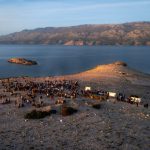Some existential relief for islanders is on the horizon.
As Sasa Paparella/Poslovni Dnevnik writes on the 10th of September, 2018, the Island Parliament, the main umbrella association for the development of the Croatian islands, sent the Government of the Republic of Croatia a letter on the issuing of a conclusion on reducing the number of agencies. The letter states that the Coastal Maritime Traffic Agency should not be extinguished and must remain independent. Islanders don’t find the idea of joining things up with the Ministry of Maritime Affairs, Transport and Infrastructure to be an acceptable solution.
“That [Coastal Maritime] agency means everything to us, because it constantly communicates with the islanders. Sometimes, for some important event, it’s necessary to temporarily modify the navigation order, which can’t be done without the approval of that agency. Up until now, we’ve dealt with those problems without a fuss, but if it was up to some other institution, it would be difficult to react to things so quickly,” said Denis Barić, the president of the Island Parliament.
Barić also warned of possible conflicts of interest because the aforementioned agency provides concessions for the carrying out of public transportation on coastal lines, which are mostly held by the state-owned shipping company, Jadrolinija. If the agency in question is indeed abolished, then all of the decisions will end up being made by the ministry, which means that the state will be giving itself concessions.
The competent ministry has however explained that “the agency’s activities will continue to be carried out in Split and there will be no change in guaranteed rights enjoyed by the islanders, neither when it comes to the availability of services, nor in terms of transparency, but [things] will be improved due to the future logistical support of the ministry”.
In addition, the Island Parliament has been forthcoming in criticising changes to the Income Tax Law, as “there is a drastic increase in lump sums for private renters”, but when it comes to the new Island Law, the proposal of which took place at the end of July during a session of the government, the islanders have only words of praise.
“We can say that all of our requirements have been accepted,” Barić is satisfied with the draft law, the implementation of which, set to happen in 2019, will require 207.2 million kuna. Representatives of the Island Parliament have publicly expressed their satisfaction with the draft law, in which all their proposals have been accepted.
Given that the gvernment has accepted the desired measures, now, along with citizens, island companies and businesses will also have the right to the supply of drinking water at a subsidised price of 50 percent of the economic price. For many islanders, this is naturally an extremely important provision for the indexation of regional development, according to which the local self-government units on islands can apply for grants from funds, and will no longer lose points because they belong to large centres on the mainland such as Zadar, Šibenik, and Dubrovnik.
“The islands had an indexation equal to the centre on the mainland to which they belong. Finally, we managed to separate the islands,” stated Barić.
Under the new law, islands with multiple local self-government units will receive an island coordinator, who will then take care that the projects refer to the entire island, and not just to individual municipalities.
It is also anticipated that each county will gain island coordinators for the drafting of various plans and projects. The law also introduced a provision by which island entrepreneurs would be entitled to privileged vehicle transportation on all ferry lines, which they have so far only been able to enjoy on vessels heading for the island on which the company is registered, because they often have to travel from one island to another.
The European Commission has approved state support of 249.2 million kuna for five ferry lines on the routes Preko – Zadar, Tkon – Biograd, Sućuraj – Drvenik, and Stari Grad – Split. This covers the difference between the revenue and the cost of regular ferry operations. Support is needed to ensure traffic on these lines with sufficient frequency throughout the year, as revenue from ticket sales exceeds the operating costs of the ferry at only the very peak of the summer season.
Click here for the original article by Sasa Paparella for Poslovni Dnevnik








